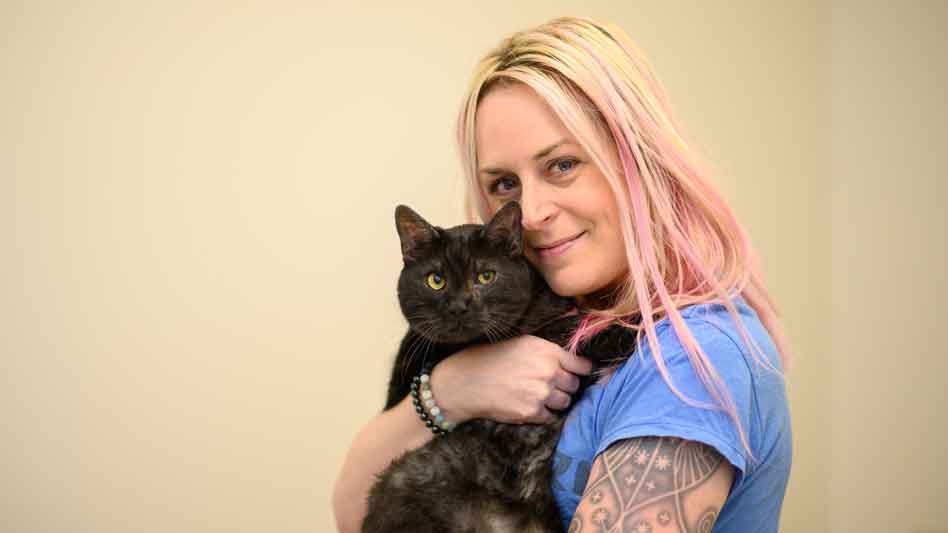Cat Fights Nasal Cancer, Receives Help From a Few Friends

When Lisa Davis first noticed her 10-year-old shorthair cat, Jones, starting to sneeze and experience a discharge from his nose and left eye early this year, it didn’t seem too serious. She bought some over-the-counter drops for pets with sinus infections.
But Jones’ symptoms worsened. There was swelling on the left side of his nose and frequent scratching. Davis took her cat to her primary veterinarian, who gave Jones antibiotic injections and anti-inflammatory medication. His symptoms markedly improved at first but returned a short time later.
After Davis took Jones back for further treatment, her veterinarian administered more antibiotics, but also referred her to the NC State Veterinary Hospital for further evaluation.
When Jones was examined at NC State in June, clinicians took a tissue sample from the swelling on his nose, and the laboratory results revealed that he was suffering from a nasal lymphoma. Antibiotics and steroids weren’t going to be enough. Cancer treatments mean hospitals and significant medical expenses. It came at a difficult time for Davis, who was in the midst of some major changes in her personal life, too.
Clinicians discussed a variety of diagnostic and treatment options with Davis, who weighed the alternatives on the basis of cost, possible outcomes and impact on Jones, who does not respond well to frequent travel. It was a stressful decision.
She knew she wanted to do what was best for Jones, who she describes as a fighter. She said her goal is to maintain his quality of life so he can live normally.
Davis chose a course of treatment with oral chemotherapy drug lomustine, administered every three to four weeks. So far he is responding well.
During treatment discussions, Davis also learned about assistance through the Petco Foundation and Blue Buffalo Cancer Treatment Fund. The treatment funds help owners like Davis defray the cost of treating companion animal cancers. These generous investments help pet parents focus on providing the best possible care for their pets rather than the cost of care.
“The financial assistance is important, for sure,” Davis said. “I feel very fortunate to have the opportunity. It is a weight off my shoulders.”
She is also grateful for the help she has received from everyone at the veterinary hospital.
“They’ve been fantastic,” she said. “I’ve been comfortable since day one. Everyone here is like a friend. It’s such a great support system. They care so much. It’s really been a positive experience.”
~Steve Volstad/NC State Veterinary Medicine
- Categories:


